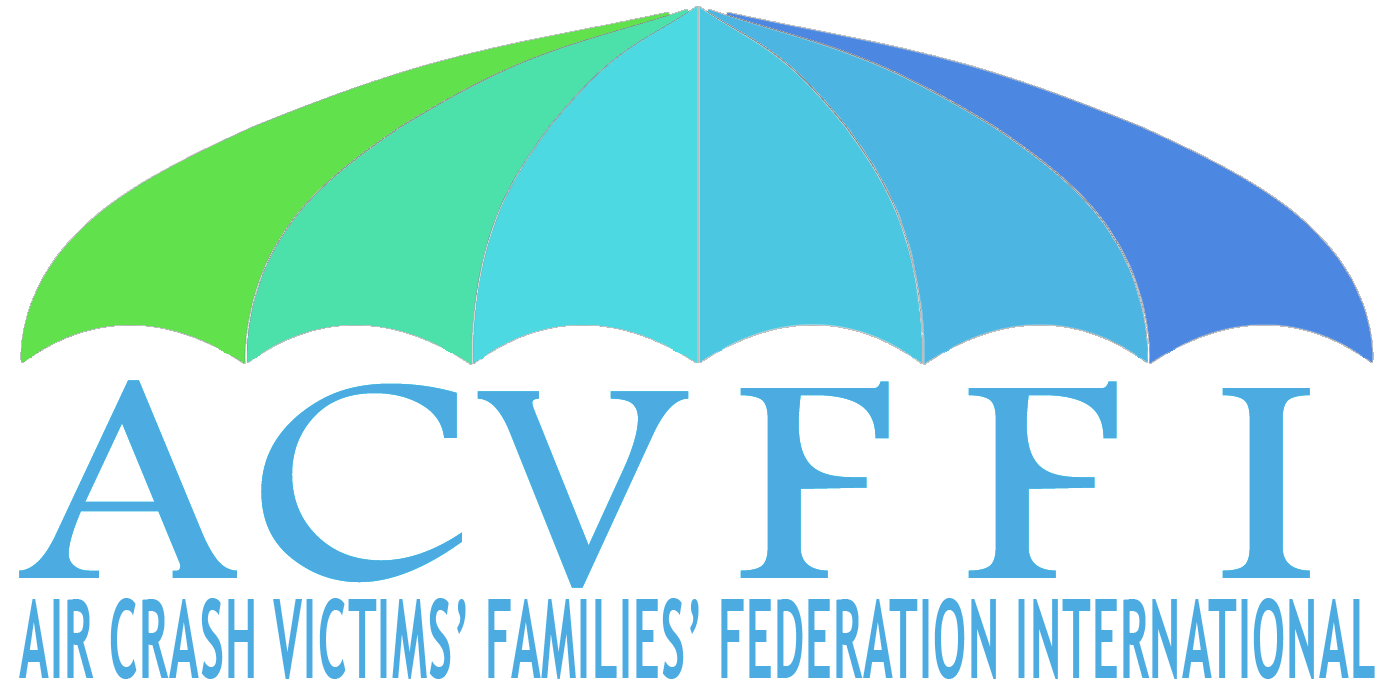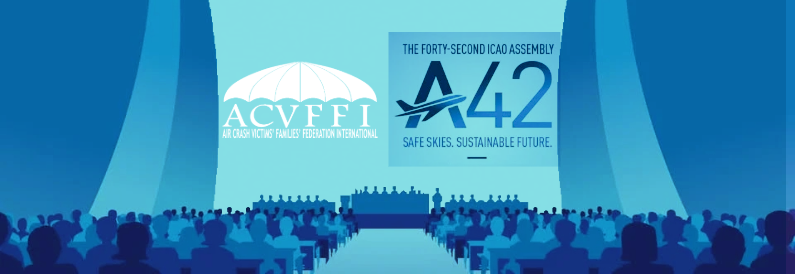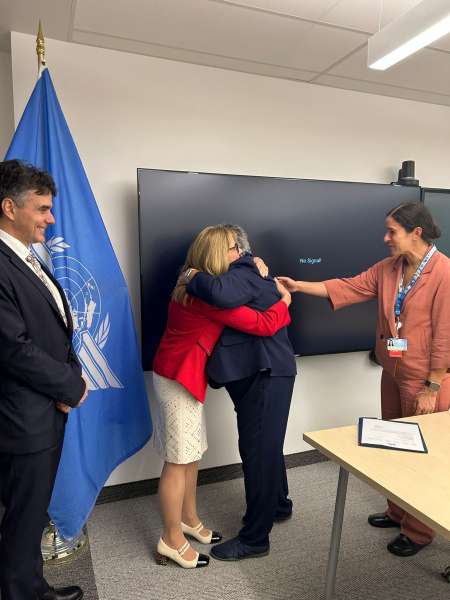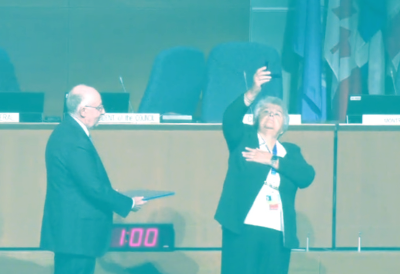From September 22 to 27, 2025, ACVFFI participated in the 42nd Session of the ICAO Assembly in Montréal, continuing its mission to advocate for the rights of victims of aviation accidents and their families.
The delegation was composed of Ms. Pilar Vera, ACVFFI Chairwoman, Claudia Carrasco, ACVFFI Secretary General, and Ms. Yvonne García Vera, who joined as Advisor, representing the Federation with dedication and clarity across multiple sessions.
This year’s participation was marked by three key contributions: the presentation of Working Papers WP/43, WP/109, and WP/290, each addressing critical gaps in aviation safety and victim assistance. These documents reflect ACVFFI’s ongoing efforts to promote transparency in accident investigations, improve compensation practices, and ensure that ICAO’s symposia on victim assistance lead to meaningful outcomes.
A special highlight of the Assembly was the awarding of the Edward Warner Award to ACVFFI President Pilar Vera, in recognition of her tireless work and the Federation’s impact on international civil aviation policy.
Through its presence and proposals, ACVFFI reaffirmed its commitment to ensuring that the voices of victims and families are heard, respected, and reflected in the global aviation framework. The Federation will continue to work collaboratively and persistently to advance policies that protect passengers and promote a safer, more compassionate aviation system.
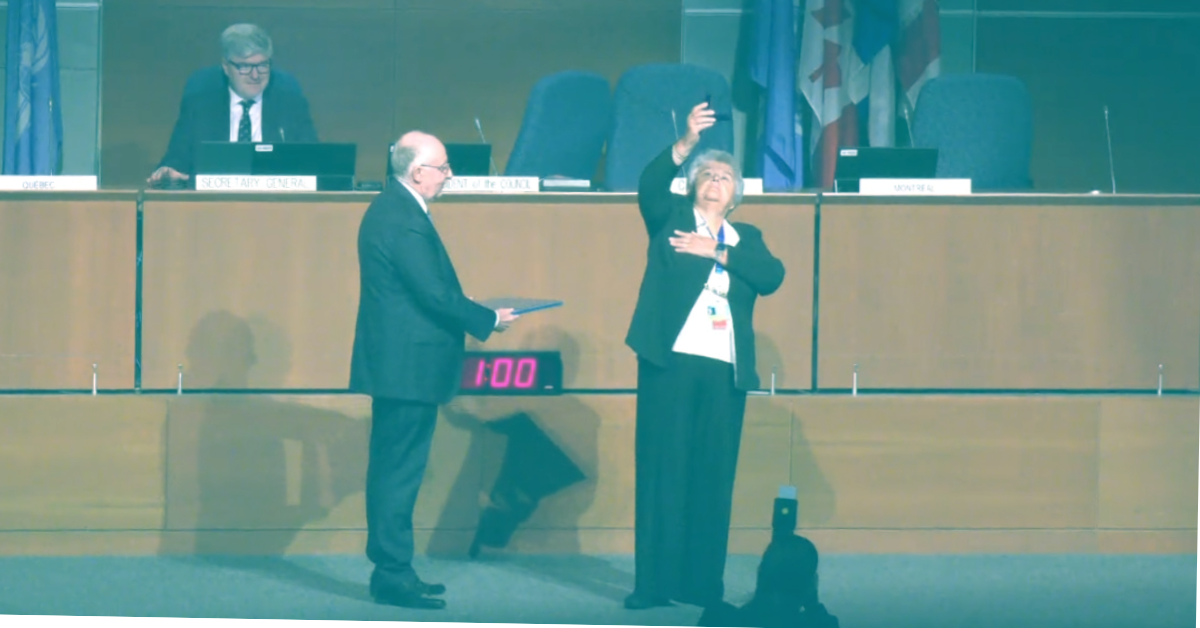
Edward Warner Award
During the 42nd Assembly, ACVFFI’s Chair, Pilar Vera, was honored with the prestigious Edward Warner Award, the highest distinction in global civil aviation.
This recognition marks a milestone in ACVFFI’s advocacy journey. Pilar Vera’s leadership has helped shape global remembrance initiatives and legislative changes that prioritize the dignity and protection of air crash victims and their families. In her speech before the Assembly, Pilar shared a powerful reflection on the path from tragedy to transformation, highlighting the importance of civil society’s voice in shaping aviation policy.
WP/109; Advocating for Fair Compensation
ACVFFI presented Working Paper WP/109 before the Legal Commission. The document highlighted a critical gap in the international framework: while air operators are required to hold insurance coverage, there is little oversight regarding how insurers actually treat victims and their families in the aftermath of an accident.
ACVFFI proposed that ICAO take concrete steps to address this issue by collecting and publishing best practices from States, insurers, and air operators, and by considering a review of the Montreal Convention to ensure fairer, more balanced compensation mechanisms. The goal is clear: to promote a more compassionate and transparent approach to compensation, one that places victims at the center without compromising the stability of the aviation industry.
The presentation, delivered by ACVFFI President Pilar Vera, was met with respect and recognition from Member States, many of which praised the Federation’s tireless advocacy and recent receipt of the Edward Warner Award. However, the debate that followed revealed the economic and procedural barriers that still stand in the way of meaningful change.
Countries such as Switzerland and Ireland expressed concern about the complexity and cost of gathering global data from insurers, and warned against reopening the Montreal Convention, fearing unintended consequences. Others, including Chile, Ghana, Colombia, Cuba, and Portugal, voiced strong support for the initiative, emphasizing the need for fair and timely treatment of victims and the value of a centralized repository of best practices.
Spain and the ICAO Secretariat clarified that work on best practices is already underway within ICAO’s Facilitation Programme, referencing previous symposiums and related documents. This existing effort was seen as overlapping with the goals of WP/109.
Ultimately, the Legal Commission decided not to adopt the proposed actions in WP/109. While the recommendations were not included in the Commission’s agenda, ICAO acknowledged the importance of the issue and committed to continuing related work through its existing programmes.
ACVFFI will continue to work tirelessly to break through the economic and institutional barriers that were raised during the debate. We believe that improving the way victims are treated is not just a matter of justice—it is a vital step forward in aviation safety.
WP/290; Structured Outcomes in ICAO Symposia on Family Assistance
ACVFFI presented Working Paper WP/290 to the Executive Committee, advocating for a structural change in how ICAO organizes its Symposia on Assistance to Aircraft Accident Victims and Their Families (AAAVF). The Federation’s proposal stems from its experience organizing and participating in the first two symposia—held in Spain in 2021 and the Netherlands in 2024.
The first symposium, AAAVF 2021, resulted in 30 concrete recommendations that were formally approved by the ICAO Council and have since guided meaningful work within ICAO’s Facilitation Programme. However, the second symposium, AAAVF 2024, concluded without formal outcomes, raising concerns about the continuity and institutional impact of these events.
ACVFFI’s WP/290 urges ICAO to establish a clear protocol for future symposia to ensure they result in validated conclusions and recommendations that can be submitted to the ICAO Council and integrated into the Organization’s strategic planning. ACVFFI emphasized that without such a mechanism, the valuable work initiated in 2021 risks being diluted, and future symposia may fail to generate the momentum needed to improve assistance to victims and families.
During the debate, many States and organizations expressed admiration for ACVFFI’s work and congratulated the Federation on receiving the Edward Warner Award. However, despite widespread praise, support for the specific measures proposed was limited. Countries such as Switzerland, the Netherlands, and Belgium acknowledged the importance of victim assistance but opposed the elevation of symposia status, citing procedural inconsistencies and resource concerns. They emphasized that high-level events are typically organized by Member States with ICAO’s support—not the other way around.
Other delegations, including Venezuela, Uruguay, Cuba, Colombia, Brazil, and South Sudan, voiced strong support for WP/290, recognizing the need for structured outcomes and continued progress in victim assistance.
In her closing remarks, ACVFFI President Pilar Vera responded with clarity and conviction:
“I would prefer fewer congratulations and more support. […] Please, do not place more obstacles in the way of future victims and families. All we ask is that the resources, efforts, and time invested in ICAO’s symposia lead to concrete results that improve the implementation of ICAO’s policies. That is not too much to ask.”
ACVFFI remains committed to ensuring that future symposia are not just ceremonial gatherings, but meaningful platforms for change. The Federation will continue to advocate for structural reforms that empower victims and families, and ensure that their voices shape the future of aviation safety.
WP/43; ACVFFI’s Push for Timely Accident Investigation Reports
ACVFFI presented Working Paper WP/43 to the Technical Commission, addressing a critical issue in aviation safety: the delayed or missing publication of final accident investigation reports. The Federation highlighted alarming statistics showing that nearly half of aviation accidents in recent years have not resulted in publicly available final reports, despite clear obligations under ICAO Annex 13 and Article 26 of the Chicago Convention.
ACVFFI emphasized that final reports are not only essential for understanding the causes of accidents but also for preventing future tragedies. These documents form the foundation of institutional learning, operational safety, and public trust. The Federation called on Member States to fulfill their responsibilities by publishing both preliminary and final reports within the established timeframes, and urged ICAO to strengthen its oversight through USOAP audits.
In her presentation, ACVFFI President Pilar Vera reminded the Assembly of the moral imperative behind this request:
“Avoiding deaths, analyzing the causes of air accidents through rigorous, transparent, independent and professional final reports—preventing them from occurring again due to similar causes.”
Although WP/43 shared the same objectives as a prior joint declaration issued by several aviation organizations—including IFATCA, ACI Europe, ECA, FSF, IATA, ICCAIA, and IFALPA—ACVFFI was not formally invited to contribute to that initiative or to the related Working Paper WP/330. While this was disappointing, ACVFFI chose to present WP/43 independently, and was encouraged to see it receive broader support during the Assembly debate. The Federation remains committed to constructive collaboration and hopes future efforts will be more inclusive of the voices of victims and their families.
The Assembly approved WP/43, marking a significant step forward in reinforcing the global commitment to transparency and safety.
